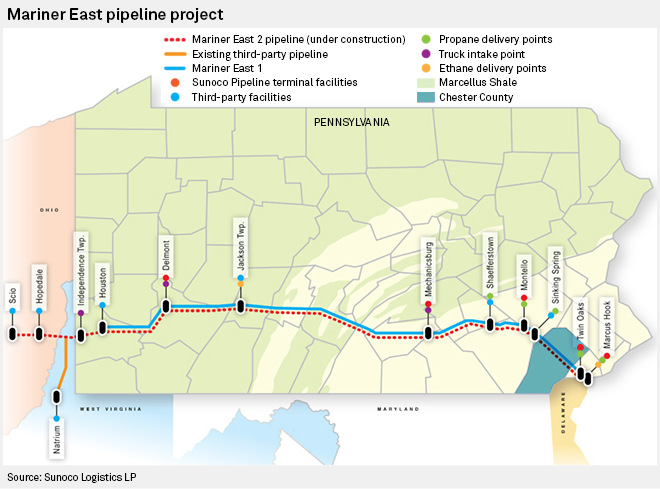A regulatory order requiring Energy Transfer LP to reroute part of the Mariner East 2 pipeline is likely to delay but not derail the NGL line, analysts agreed.
"I don't think it's going to be so prohibitive where they're going to take the project down and not move forward with it, especially because it's well over 90% done," Tortoise Capital Advisors LLC's managing director and senior portfolio manager Brian Kessens said Sept. 15. "What, frankly, is most disappointing to the company is the opportunity cost of another month of delays before they can bring it online."
The Pennsylvania Department of Environmental Protection, or DEP, ordered Energy Transfer subsidiary Sunoco Pipeline LP to suspend work on the pipeline Sept. 11, a month after 8,000 gallons of drilling mud was inadvertently released into a stream and flowed into Marsh Creek Lake, a popular state park.
The state's action requires Sunoco to reroute the 350-mile, 20-inch pipeline around wetlands near the lake in Chester County, Pa., by moving the line about half of a mile north of its current route to an alternate path.
DEP acknowledged that building along the new path would require Sunoco to obtain new easements and rights-of-way in a formerly rural county that has become a suburban bedroom community outside Philadelphia.
Kessens said a rule of thumb is that pipelines cost $1 million per mile, but it is likely Sunoco would have to spend a little more because of the suburban location.
"Creating a new pipeline in Pennsylvania, it's not like a new pipeline through Texas," Kessens said. "You got a lot of communities that you have to go around, a lot of wetlands ... they are trying to drill these really long laterals, which is actually a better and safer way to drill, generally, but it is more subject to spills."
A portion of Mariner East 2 is open for service on a reduced basis using an older 12-inch pipeline in Chester and neighboring Delaware County until the 20-inch line is completed next year, an Energy Transfer spokeswoman confirmed Sept. 15.
"We do not expect the order will impact timing on [Energy Transfer]'s 16-inch Mariner East 2X project, which is expected to bring 250,000 barrels per day of capacity online by the end of the year," Height Securities LLC midstream analyst Josh Price told his clients Sept. 14. "However, the order may delay the final stage of the [20-inch] Mariner East 2 expansion, which is slated for completion in 2Q21."
Energy Transfer has had no comment on the DEP's action beyond saying it was working with regulators to finish the pipeline. "We are currently reviewing the DEP's administrative order and will continue to work closely with the DEP on this issue as we have done throughout the duration of this project," Energy Transfer spokeswoman Amanda Gorgueiro said in an email after the order's Sept. 11 release.
The Mariner East family of NGL pipelines — Mariner East 1, Mariner East 2 and Mariner East 2X — share a common route through the suburban Philadelphia counties of Chester and Delaware before arriving at the Marcus Hook terminal on the Delaware River. At the terminal, ethane, butane and propane are transferred to ships and railcars for transportation to downstream users, such as European plastics manufacturers. Several Appalachian shale gas drillers, notably Antero Resources Corp. and anchor shipper Range Resources Corp., use the Mariner lines to realize better NGL prices overseas and narrow the difference between the local market and the U.S.'s major NGL market, the Texas Gulf Coast.
Work on Mariner East has been halted and restarted repeatedly because of environmental violations, and Energy Transfer has racked up $15.9 million in fines from the DEP during its construction.




